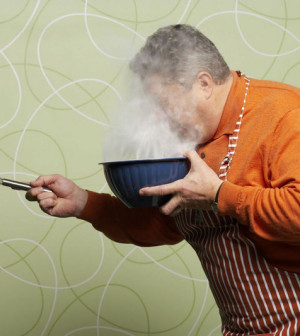- Double Mastectomy May Offer No Survival Benefit to Women With Breast Cancer
- Toxic Lead Found in Cinnamon Product, FDA Says
- Certain Abbott Blood Sugar Monitors May Give Incorrect Readings
- Athletes Can Expect High Ozone, Pollen Counts for Paris Olympics
- Fake Oxycontin Pills Widespread and Potentially Deadly: Report
- Shingles Vaccine Could Lower Dementia Risk
- Your Odds for Accidental Gun Death Rise Greatly in Certain States
- Kids From Poorer Families Less Likely to Survive Cancer
- Tough Workouts Won’t Trigger Cardiac Arrest in Folks With Long QT Syndrome
- At-Home Colon Cancer Test Can Save Lives
Parents of Kids With Food Allergies Believe They’re Allergic, Too

Many parents of children with food allergies mistakenly believe they are allergic, too, a new study finds.
The study included parents who said they, like their kids, had food allergies. But fewer than one-third of the parents tested positive for food allergies.
The study was published Oct. 12 in the Annals of Allergy, Asthma and Immunology.
“Either people haven’t been tested and are assuming an allergy from a previous reaction to a food, or they haven’t been tested properly and may not truly have an allergy. Allergy testing, including blood and skin prick testing, is not always reliable,” co-lead author Dr. Melanie Makhija said in a journal news release.
The study included nearly 2,500 parents whose children had food allergies. Of these, almost 14 percent of parents said they themselves had a food allergy. But when those parents were tested, researchers found that only 28 percent of them had a true allergy.
Previous studies have focused on the general adult population, according to study co-lead author Dr. Rachel Robison.
“While we found positive test results were more common in parents of kids with food allergies, the actual levels in the blood for the foods were quite low. Low positives in allergy testing are more likely to be false positives. This points to the importance of proper testing for any kind of allergy, but particularly food allergies,” Robison said.
“Interestingly, we also found that of the parents who reported no food allergy, 14 percent had positive tests to peanut and sesame, for example,” she said.
Robison and Makhija are allergists at Ann & Robert H. Lurie Children’s Hospital of Chicago and assistant professors at Northwestern University Feinberg School of Medicine in Chicago.
More information
The American Academy of Family Physicians has more on food allergies.
Source: HealthDay
Copyright © 2024 HealthDay. All rights reserved.










